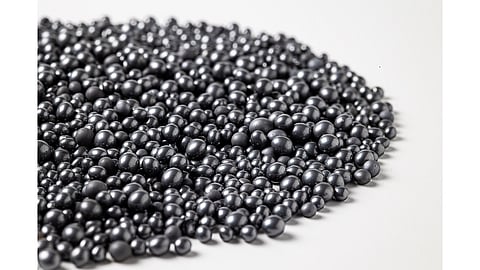

GCL Technology’s FBR produced granular silicon now takes 40% share of raw material of its leading customers
GCL says granular silicon reduces power usage by 19.5 billion kWh per year and lowers carbon emissions
The company has now fully exited Siemens method polysilicon production and is expanding R&D investments
Chinese solar wafer and polysilicon manufacturing giant GCL Technology Holdings Limited’s bet on fluidized bed reactor (FBR) production process for granular silicon seems to be paying off with its increasing adaption rate. The company announced that its granular silicon estimated to account for more than 40% at its leading customers.
In 2024, GCL’s total sales to the company’s top 5 customers represented 71.2% of its total sales volume of granular silicon (see GCL Technology Suffers RMB 4.75 Billion Net Loss In 2024).
At the end of 2024, GCL’s total granular silicon production capacity reached 480,000 MT with an output of 269,200 tons representing 32% year-on-year (YoY) increase. Its shipments of granular silicon also went up by 45% with 281,900 tons, and a ‘sales-to-production ratio of 105%.’ The Chinese manufacturer says its granular silicon inventory is the lowest in the industry.
GCL attributes this milestone to the improved quality of its FBR produced granular silicon. The silicon producer emphasizes, as of February 2025, 95% of its production reached a purity spec of ≤0.5 parts per billion in weight (PPBW) for the key 5-metal impurities and taking into consideration of 18 metals, 91% of the production meets ≤1 PPBW.
“Against the backdrop of severe losses in the PV industry and intense competition in polysilicon, granular silicon remains a stable pillar,” stated GCL. The key mainstream product for GCL, it sees granular silicon as one that will help it remain competitive and stable despite industry fluctuations.
GCL’s annual mono-silicon crystal pulling capacity stood at 10 GW, while wafer production capacity was 35 GW.
As the name suggests, granular silicon exists in small particle form, compared to silicon chunks (rods) produced via the modified Siemens method. To minimize the risk of contamination, GCL says it has been able to increase the particle size to now exceed 2mm. This large particle size has shown improved performance in crystal pulling process while reducing the wire breakage rates in wafer slicing. The finished product output increased by close to 4 kg/day.
The manufacturer claims its self-developed fluidized bed reactor (FBR) granular silicon saves about 19.5 billion kWh of electricity and reduces 10.48 million tons of carbon emissions annually, compared to the mainstream Siemens method.
Since carbon footprint is now a key indicator to measure the competitiveness in the PV industry, GCL says all its manufacturing bases have now achieved 100% coverage of sustainable supply chains with carbon footprint certifications across all key segments, including metallurgical silicon, granular polysilicon, crystal pulling and wafer slicing.
While declaring its annual financial report for 2024 on March 28, 2025, GCL announced that it has fully exited all direct and indirect investments related to the Siemens-method polysilicon production ‘severing all ties with Xinjiang-based polysilicon capacity.’
Instead, it is now redirecting its focus to the 4 major 100,000-ton granular polysilicon bases in Xuzhou (Jiangsu), Leshan (Sichuan), Hohhot and Baotou (Inner Mongolia). It is also investing extensively in R&D, having spent RMB 1.102 billion ($151.6 million) in 2024, accounting for 7.3% of the total revenue.
Apart from GCL, REC Silicon of Norway is the only other polysilicon producer that uses FBR production method, however its recently produced polysilicon failed the qualification test due to impurities related to the post-reactor product finishing and handling systems. It has now stopped polysilicon production in the US, and instead will produce silane gas. (see REC Silicon To Exit US Polysilicon Manufacturing For Good).
This makes GCL the only known FBR produced silicon manufacturer in the world. GCL has also formed a dedicated IP enforcement team to vigorously defend against infringement.
GCL is also working on a polysilicon production plant in the UAE in collaboration with Mubadala Investment Company. It originally announced the project in mid-2024, but does not refer to it in its 2024 financial results (see ‘Largest’ Polysilicon Production Plant Outside China).
